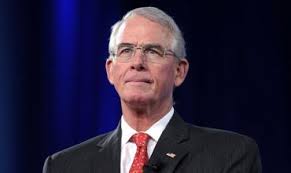Offshore drilling has no place in our oceans today. This week, Congress has an opportunity to protect our coastal beaches and communities from being subjected to a lifetime of dangerous offshore drilling.
The communities we represent and others like them across the country are standing up to the Administration’s plans to open nearly all federal waters to oil and gas development. Now it is time for our colleagues in the House of Representatives to stand with us to ensure we don’t leave an environmental and economic mess for future generations.
Offshore drilling is a threat we can stop, which is why we’ve introduced two bills to halt this unwanted development before it begins.

The Coastal and Marine Economies Protection Act (H.R. 1941)would ban future oil and gas leasing in the Atlantic and Pacific Oceans. The Protecting and Securing Florida’s Coastline Act (H.R. 205)would permanently extend the existing ban on leasing off Florida’s Gulf Coast, which is set to expire in 2022.
Together, these two bills would effectively protect our coasts from drilling, and inevitably spilling, and the life-altering disasters like the BP Deepwater Horizon blowout.
If the Trump administration opens our waters to oil drilling, it is not a question of if, but when, an oil blowout would take a toll on our ocean resources and local economies especially on small businesses.
Spills and blowouts are unavoidable realities when companies drill. The federal government wants to drill in new, untapped areas, which requires dangerous exploratory drilling. That’s exactly what BP was doing when an exploratory well blew and caused the Deepwater Horizon rig to explode.

The disaster took the lives of 11 rig workers, gushed over 200 million gallons of oil into the Gulf of Mexico and persisted for 87 days as engineers tried and failed to seal the well. The impact is still felt today and it is estimated that more than 10 million user-days of beach, fishing and boating and the economic activity connected with them were lost due to the spill.
If Congress fails to block new offshore drilling, coastal communities and states will not be the only ones to shoulder all the negative consequences that follow. When there is a disaster in any state, national aid and action is needed.
In addition to the rampant polluting culture, drilling in new areas would require heavy industrialization along the coast. The addition of large refineries onshore, pipeline networks, and rigs obscuring the horizon would ultimately transform the states we call home.
This type of infrastructure is entirely at odds with the existing character of our beach towns and coastal small businesses. People move to the coast to build a life and start a family because of the clean waters, healthy atmosphere, and ample natural resources that one can find there. With oil development, the lure of living by the coast quickly fades.
We also know that our coastal communities are threatened by rising seas from the climate crisis. That’s why we have to reduce our dependency on oil, cut carbon pollution, and build with resilience on our coasts. We simply can’t afford to tie our communities to dangerous drilling that compounds the risks we face.

Expanded offshore drilling would also drain the pockets of the hardworking Americans we represent. Healthy ecosystems and clean coastlines along the Pacific, Atlantic, and eastern Gulf of Mexico are major economic drivers for our country.
They fuel tourism, fishing and recreation industries that support more than 2.6 million jobs and generate roughly $180 billion in GDP each year. When our oceans are in good shape, they can bring consistent revenue to our states and put food on the table of families across America. We risk breaking this economic engine by adding oil to the mix. Underscoring it all: oil and gas are finite resources. So when the oil runs out, the jobs disappear too.
Our beaches, shorelines, and vibrant oceans are the fundamental underpinning of income and revenue throughout our coastal communities. To guarantee that coastal economies – and the nation’s economy – continue to function as they do today, we cannot allow offshore drilling to dirty our shores and stunt our economies.
It is time for Congress to act and shut the door on future oil and gas activities.
The opposition to offshore drilling runs deep and wide enough to cut across party lines. We are counting on our fellow Representatives to show strong bipartisan support for H.R. 205 and H.R. 1941. Let’s stand with our coastal neighbors and put a stop to this reckless expansion of offshore drilling altogether.
Francis Rooney represents the 19th Congressional District of Florida in the United States House of Representatives. He is vicechairman of the House Foreign Affairs Committee and serves on the Committee on Education and the Workforce.
Joe Cunningham represents the 1st Congressional District of South Carolina in the United States House of Representatives.
Kathy Castor represents the 14th Congressional District of Florida in the United States House of Representatives. She is the Chair of the Select Committee on the Climate Crisis and serves on the Committee on Energy and Commerce.
“The Invading Sea” is a collaboration of four South Florida media organizations — the South Florida Sun Sentinel, Miami Herald, Palm Beach Post and WLRN Public Media.



